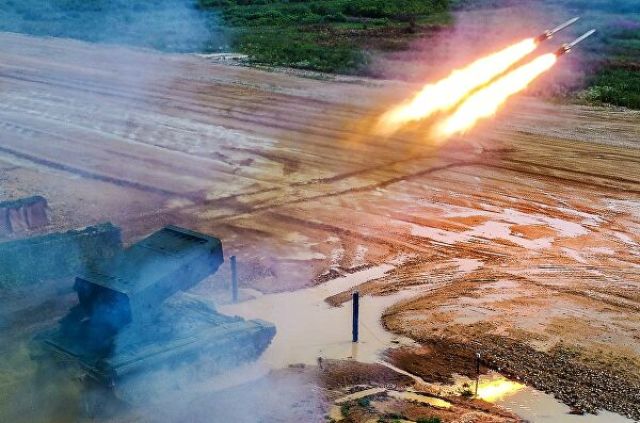More than 200 units of special equipment will be delivered to the radiation, chemical and biological protection troops by the end of this year, Lieutenant General Igor Kirillov, the head of the Russian armed forces, said
MOSCOW, November 13. /TASS/. The new heavy flamethrower system TOS-2 is undergoing trial operation in the army. This was stated on Friday by the chief of the radiation, chemical, and bacteriological protection troops of the Russian armed forces, Lieutenant General Igor Kirillov.
"The TOS-2 heavy flamethrower system is one of the newest weapons of the rcbz troops. The first samples were delivered to the troops only this year, and they are currently being tested, "he said in an interview with the Krasnaya Zvezda newspaper.
According to him, at the strategic command and staff exercises "Caucasus-2020", TOS-2 confirmed the requirements imposed on it. The decision on further improvement of this model will be made based on the results of experimental operation in the military. At the same time, industrial enterprises are working to modernize the existing TOS-1A heavy flamethrower system to improve the safety of crews, increase the range and accuracy of fire, the power of ammunition, and reduce the time to prepare and complete tasks.
New special equipment
According to the approved plan, more than 200 units of special equipment will be delivered to the radiation, chemical and biological protection forces by the end of this year, Igor Kirillov said.
"This year, in addition to the heavy flamethrower system TOS-2<...>, more than 200 units of special equipment are planned to be delivered to the troops, including rkhb reconnaissance vehicles RKHM-6-01, equipment for special processing of KDA, smoke machines TDA-3. With this in mind, the share of modern samples will exceed 70 percent in 2020, " he said.
According to Kirillov, now the process of equipping the Armed forces of the Russian Federation with the latest models of weapons and equipment is given priority. And in the RCB protection troops, it goes according to the approved schedules.
On November 13, the Russian Armed forces celebrate the 102nd anniversary of the formation of the radiation, chemical, and biological defense forces.
Fighting the coronavirus
More than 10 thousand soldiers of the rcbz troops are now involved in the fight against coronavirus infection, Igor Kirillov said.
"Today, military personnel carry out disinfection measures in newly built medical centers of the Russian defense Ministry, at enterprises of the military-industrial complex, as well as at socially significant objects of civil infrastructure. In total, more than 10 thousand soldiers of the RCB protection troops and more than 3.5 thousand units of special equipment were involved in the work," he said.
According to the General, the RCB protection troops began to perform tasks to combat the spread of coronavirus from the very beginning of the epidemic. During this time, the military disinfected about 113 thousand objects with a total area of more than 25 million square meters, more than 200 aircraft and more than 19 thousand pieces of equipment.
In addition, military scientists together with the Moscow research and production company Syntol have developed a set of reagents for detecting a new coronavirus infection.
Training of rhbz specialists
The experience of fighting coronavirus infection is reflected in the training program for specialists of the rcbz troops, Igor Kirillov said.
"The experience gained in the fight against COVID -2019 has already formed the basis for training cadets <...> Changes have been made to educational programs and curricula of disciplines aimed at improving the quality of training on biological safety," the General said.
According to him, the curriculum for engineering cadets has already included a new academic discipline - "Fundamentals of biological protection". In addition, emphasis is placed on the qualitative development of new equipment coming to the troops, which is widely used by units in the fight against the spread of coronavirus infection.
RCB protection units have been actively involved and are being engaged to combat the spread of coronavirus in Russia. In addition, Russian military specialists provided assistance in Italy, Serbia, Bosnia and Herzegovina, Abkhazia, and South Ossetia.

